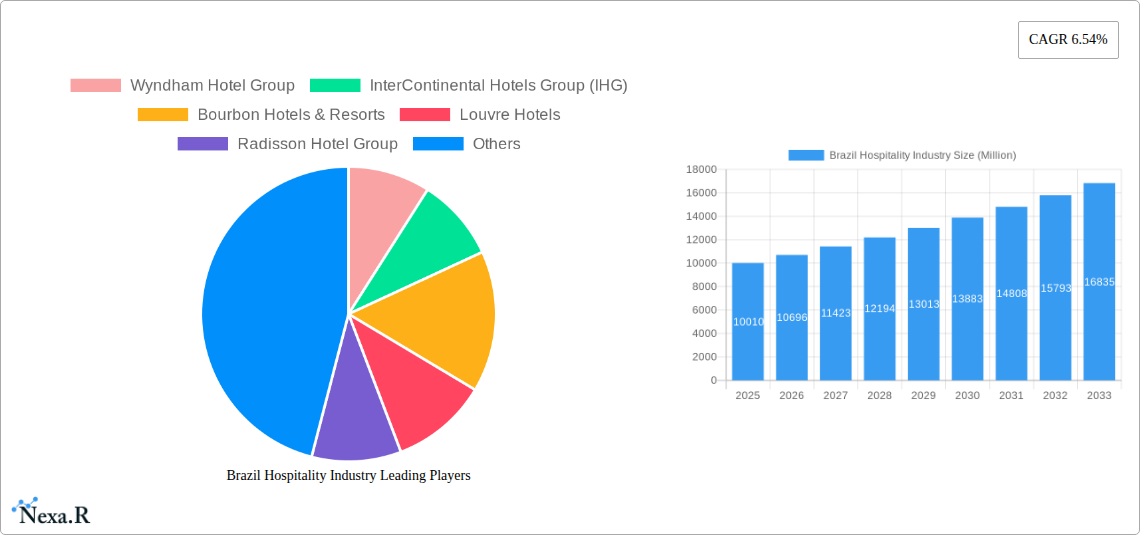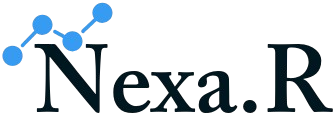Key Insights
The Brazilian hospitality industry, valued at approximately $10.01 billion in 2025, is projected to experience robust growth, with a Compound Annual Growth Rate (CAGR) of 6.54% from 2025 to 2033. This expansion is driven by several key factors. Firstly, Brazil's burgeoning tourism sector, fueled by increasing disposable incomes and a growing middle class, is significantly boosting demand for hotel accommodations across all segments. Secondly, the country's hosting of major sporting events and conferences continues to attract a substantial influx of international and domestic travelers. Furthermore, investments in infrastructure improvements, particularly in transportation and connectivity, are enhancing accessibility to various tourist destinations within Brazil, further stimulating the hospitality market. The segment breakdown reveals a diverse landscape, encompassing chain hotels, independent hotels, and service apartments, catering to budget-conscious travelers, as well as those seeking mid-range and luxury accommodations. Leading players like Wyndham Hotel Group, IHG, and Marriott International are strategically positioned to benefit from this growth, while smaller, independent hotels are also capitalizing on niche markets and localized demand.

Brazil Hospitality Industry Market Size (In Billion)

However, the industry faces challenges. Inflationary pressures and fluctuating exchange rates can impact operational costs and profitability. Competition within the market, particularly in major cities, necessitates continuous innovation and differentiation strategies to maintain a competitive edge. Sustainability concerns and the growing emphasis on eco-tourism also present opportunities and necessitate the adoption of environmentally responsible practices. Future growth will likely depend on the industry's ability to adapt to these economic and environmental factors, while consistently delivering high-quality services that meet evolving guest expectations. The forecast period of 2025-2033 anticipates continued expansion, with a likely acceleration in growth during periods of increased global economic stability and positive tourist sentiment toward Brazil.

Brazil Hospitality Industry Company Market Share

Brazil Hospitality Industry: Market Report 2019-2033
This comprehensive report provides an in-depth analysis of the Brazilian hospitality industry, covering market dynamics, growth trends, key players, and future prospects. With a study period spanning 2019-2033, a base year of 2025, and a forecast period of 2025-2033, this report is an invaluable resource for industry professionals, investors, and strategists seeking to understand and capitalize on opportunities in this dynamic market. The report includes detailed analysis of parent markets (Tourism and Leisure) and child markets (Budget, Mid-scale, and Luxury Hotels; Chain vs. Independent Hotels).
Brazil Hospitality Industry Market Dynamics & Structure
The Brazilian hospitality market, valued at xx Million in 2024, exhibits a moderately consolidated structure. Key players such as Wyndham Hotel Group, InterContinental Hotels Group (IHG), Accor SA, Marriott International Inc., and Radisson Hotel Group (prior to acquisition by Choice Hotels) hold significant market share, but a substantial portion is occupied by independent hotels and smaller chains. Technological innovation, particularly in revenue management and guest experience technologies, is a significant driver. However, factors like high infrastructure costs and bureaucratic hurdles represent innovation barriers. The regulatory framework, while undergoing reforms, presents both opportunities and challenges for businesses. The market also witnesses considerable M&A activity, as exemplified by the Choice Hotels acquisition of Radisson Hotels Americas.
- Market Concentration: Moderately consolidated, with leading chains holding xx% market share in 2024.
- Technological Innovation: Focus on revenue management systems (RMS), guest experience platforms, and online booking technologies.
- Regulatory Framework: A mix of opportunities and challenges due to ongoing reforms and bureaucratic processes.
- M&A Activity: Significant activity, with several large acquisitions shaping the market landscape (e.g., Choice Hotels acquisition of Radisson Hotels Americas).
- Competitive Product Substitutes: Growing popularity of alternative accommodations like Airbnb poses a challenge to traditional hotels.
- End-User Demographics: Growing middle class and increasing inbound tourism are key drivers of demand.
Brazil Hospitality Industry Growth Trends & Insights
The Brazilian hospitality market experienced significant growth during the historical period (2019-2024), driven by factors including economic recovery, increased domestic and international tourism, and infrastructure development. However, this growth was punctuated by the challenges presented by the COVID-19 pandemic. The market is projected to continue its expansion during the forecast period (2025-2033), with a Compound Annual Growth Rate (CAGR) of xx%. Technological disruption, including the adoption of smart hotel technologies and data analytics, is transforming the industry. Consumer behavior is also shifting towards more personalized and experiential travel, influencing the demand for unique hospitality offerings. The market size is expected to reach xx Million by 2033.
Dominant Regions, Countries, or Segments in Brazil Hospitality Industry
The Brazilian hospitality market is geographically diverse, with significant growth concentrated in key metropolitan areas like São Paulo, Rio de Janeiro, and Brasilia, driven by robust business travel and tourism. The Mid and Upper Mid-scale Hotels segment demonstrates the strongest growth potential, driven by the expansion of the middle class and increasing demand for quality at reasonable prices.
- Key Growth Drivers: Economic growth, rising disposable incomes, infrastructure improvements, and increased tourism.
- Market Share: São Paulo and Rio de Janeiro command the largest market share by revenue.
- Growth Potential: Mid-range and luxury hotels show the greatest growth potential.
- Chain vs. Independent: Chain hotels dominate in major cities; independent hotels prevalent in smaller towns.
Brazil Hospitality Industry Product Landscape
The Brazilian hospitality industry offers a diverse range of products, from budget-friendly accommodations to luxury resorts. Innovation is focused on enhancing guest experiences through personalized services, technological integration (e.g., mobile check-in, smart room controls), and sustainable practices. Unique selling propositions include eco-tourism initiatives, culturally immersive experiences, and specialized wellness programs.
Key Drivers, Barriers & Challenges in Brazil Hospitality Industry
Key Drivers:
- Increasing domestic and international tourism.
- Growth of the middle class with higher disposable income.
- Infrastructure improvements in major cities.
- Investment in new hotels and resorts.
Key Challenges:
- High inflation and economic instability.
- Security concerns in certain areas.
- Bureaucratic hurdles and regulations.
- Seasonality impacting occupancy rates.
Emerging Opportunities in Brazil Hospitality Industry
Untapped markets include eco-tourism destinations, wellness retreats, and unique cultural experiences. Opportunities exist in developing innovative service offerings catered to specific market segments, such as millennial travelers and luxury experiences.
Growth Accelerators in the Brazil Hospitality Industry Industry
Strategic partnerships, investments in technology, and expansion into underserved markets are key growth catalysts. Technological advancements in revenue management, guest experience personalization, and sustainability initiatives will further accelerate growth.
Key Players Shaping the Brazil Hospitality Industry Market
- Wyndham Hotel Group
- InterContinental Hotels Group (IHG)
- Bourbon Hotels & Resorts
- Louvre Hotels
- Radisson Hotel Group
- Marriott International Inc
- Nacional Inn Hoteis e Centros de Convencoes
- Intercity Hotels
- Accor SA
Notable Milestones in Brazil Hospitality Industry Sector
- August 2023: Choice Hotels acquires Radisson Hotels Americas for USD 675 million.
- February 2024: Accor partners with IDeaS for global revenue management software services.
In-Depth Brazil Hospitality Industry Market Outlook
The Brazilian hospitality market presents significant long-term growth potential, driven by continued economic expansion, tourism growth, and technological innovation. Strategic investments in infrastructure, sustainable practices, and personalized guest experiences will be crucial for success in this competitive yet dynamic market. The market is poised for continued expansion, offering lucrative opportunities for both established players and new entrants.
Brazil Hospitality Industry Segmentation
-
1. Type
- 1.1. Chain Hotels
- 1.2. Independent Hotels
- 1.3. Service Apartments
-
2. Segment
- 2.1. Budget and Economy Hotels
- 2.2. Mid and Upper Mid-scale Hotels
- 2.3. Luxury Hotels
Brazil Hospitality Industry Segmentation By Geography
- 1. Brazil

Brazil Hospitality Industry Regional Market Share

Geographic Coverage of Brazil Hospitality Industry
Brazil Hospitality Industry REPORT HIGHLIGHTS
| Aspects | Details |
|---|---|
| Study Period | 2020-2034 |
| Base Year | 2025 |
| Estimated Year | 2026 |
| Forecast Period | 2026-2034 |
| Historical Period | 2020-2025 |
| Growth Rate | CAGR of 6.54% from 2020-2034 |
| Segmentation |
|
Table of Contents
- 1. Introduction
- 1.1. Research Scope
- 1.2. Market Segmentation
- 1.3. Research Methodology
- 1.4. Definitions and Assumptions
- 2. Executive Summary
- 2.1. Introduction
- 3. Market Dynamics
- 3.1. Introduction
- 3.2. Market Drivers
- 3.2.1. Growing Tourism; Consistent Demand for Business Travel and Corporate Hospitality Services
- 3.3. Market Restrains
- 3.3.1 Political Instability and Uncertainty; Limited Access to Transportation
- 3.3.2 Inadequate Roads
- 3.3.3 and Insufficient Connectivity
- 3.4. Market Trends
- 3.4.1. Rising Tourism is Fueling Market Growth
- 4. Market Factor Analysis
- 4.1. Porters Five Forces
- 4.2. Supply/Value Chain
- 4.3. PESTEL analysis
- 4.4. Market Entropy
- 4.5. Patent/Trademark Analysis
- 5. Brazil Hospitality Industry Analysis, Insights and Forecast, 2020-2032
- 5.1. Market Analysis, Insights and Forecast - by Type
- 5.1.1. Chain Hotels
- 5.1.2. Independent Hotels
- 5.1.3. Service Apartments
- 5.2. Market Analysis, Insights and Forecast - by Segment
- 5.2.1. Budget and Economy Hotels
- 5.2.2. Mid and Upper Mid-scale Hotels
- 5.2.3. Luxury Hotels
- 5.3. Market Analysis, Insights and Forecast - by Region
- 5.3.1. Brazil
- 5.1. Market Analysis, Insights and Forecast - by Type
- 6. Competitive Analysis
- 6.1. Market Share Analysis 2025
- 6.2. Company Profiles
- 6.2.1 Wyndham Hotel Group
- 6.2.1.1. Overview
- 6.2.1.2. Products
- 6.2.1.3. SWOT Analysis
- 6.2.1.4. Recent Developments
- 6.2.1.5. Financials (Based on Availability)
- 6.2.2 InterContinental Hotels Group (IHG)
- 6.2.2.1. Overview
- 6.2.2.2. Products
- 6.2.2.3. SWOT Analysis
- 6.2.2.4. Recent Developments
- 6.2.2.5. Financials (Based on Availability)
- 6.2.3 Bourbon Hotels & Resorts
- 6.2.3.1. Overview
- 6.2.3.2. Products
- 6.2.3.3. SWOT Analysis
- 6.2.3.4. Recent Developments
- 6.2.3.5. Financials (Based on Availability)
- 6.2.4 Louvre Hotels
- 6.2.4.1. Overview
- 6.2.4.2. Products
- 6.2.4.3. SWOT Analysis
- 6.2.4.4. Recent Developments
- 6.2.4.5. Financials (Based on Availability)
- 6.2.5 Radisson Hotel Group
- 6.2.5.1. Overview
- 6.2.5.2. Products
- 6.2.5.3. SWOT Analysis
- 6.2.5.4. Recent Developments
- 6.2.5.5. Financials (Based on Availability)
- 6.2.6 Marriott International Inc
- 6.2.6.1. Overview
- 6.2.6.2. Products
- 6.2.6.3. SWOT Analysis
- 6.2.6.4. Recent Developments
- 6.2.6.5. Financials (Based on Availability)
- 6.2.7 Nacional Inn Hoteis e Centros de Convencoes
- 6.2.7.1. Overview
- 6.2.7.2. Products
- 6.2.7.3. SWOT Analysis
- 6.2.7.4. Recent Developments
- 6.2.7.5. Financials (Based on Availability)
- 6.2.8 Intercity Hotels**List Not Exhaustive
- 6.2.8.1. Overview
- 6.2.8.2. Products
- 6.2.8.3. SWOT Analysis
- 6.2.8.4. Recent Developments
- 6.2.8.5. Financials (Based on Availability)
- 6.2.9 Accor SA
- 6.2.9.1. Overview
- 6.2.9.2. Products
- 6.2.9.3. SWOT Analysis
- 6.2.9.4. Recent Developments
- 6.2.9.5. Financials (Based on Availability)
- 6.2.1 Wyndham Hotel Group
List of Figures
- Figure 1: Brazil Hospitality Industry Revenue Breakdown (Million, %) by Product 2025 & 2033
- Figure 2: Brazil Hospitality Industry Share (%) by Company 2025
List of Tables
- Table 1: Brazil Hospitality Industry Revenue Million Forecast, by Type 2020 & 2033
- Table 2: Brazil Hospitality Industry Revenue Million Forecast, by Segment 2020 & 2033
- Table 3: Brazil Hospitality Industry Revenue Million Forecast, by Region 2020 & 2033
- Table 4: Brazil Hospitality Industry Revenue Million Forecast, by Type 2020 & 2033
- Table 5: Brazil Hospitality Industry Revenue Million Forecast, by Segment 2020 & 2033
- Table 6: Brazil Hospitality Industry Revenue Million Forecast, by Country 2020 & 2033
Frequently Asked Questions
1. What is the projected Compound Annual Growth Rate (CAGR) of the Brazil Hospitality Industry?
The projected CAGR is approximately 6.54%.
2. Which companies are prominent players in the Brazil Hospitality Industry?
Key companies in the market include Wyndham Hotel Group, InterContinental Hotels Group (IHG), Bourbon Hotels & Resorts, Louvre Hotels, Radisson Hotel Group, Marriott International Inc, Nacional Inn Hoteis e Centros de Convencoes, Intercity Hotels**List Not Exhaustive, Accor SA.
3. What are the main segments of the Brazil Hospitality Industry?
The market segments include Type, Segment.
4. Can you provide details about the market size?
The market size is estimated to be USD 10.01 Million as of 2022.
5. What are some drivers contributing to market growth?
Growing Tourism; Consistent Demand for Business Travel and Corporate Hospitality Services.
6. What are the notable trends driving market growth?
Rising Tourism is Fueling Market Growth.
7. Are there any restraints impacting market growth?
Political Instability and Uncertainty; Limited Access to Transportation. Inadequate Roads. and Insufficient Connectivity.
8. Can you provide examples of recent developments in the market?
February 2024: Accor made an agreement with IDeaS, a leading provider of hospitality revenue optimization software and services. With this partnership, IDeaS will provide Accor with global revenue management software (RMS) services.
9. What pricing options are available for accessing the report?
Pricing options include single-user, multi-user, and enterprise licenses priced at USD 3800, USD 4500, and USD 5800 respectively.
10. Is the market size provided in terms of value or volume?
The market size is provided in terms of value, measured in Million.
11. Are there any specific market keywords associated with the report?
Yes, the market keyword associated with the report is "Brazil Hospitality Industry," which aids in identifying and referencing the specific market segment covered.
12. How do I determine which pricing option suits my needs best?
The pricing options vary based on user requirements and access needs. Individual users may opt for single-user licenses, while businesses requiring broader access may choose multi-user or enterprise licenses for cost-effective access to the report.
13. Are there any additional resources or data provided in the Brazil Hospitality Industry report?
While the report offers comprehensive insights, it's advisable to review the specific contents or supplementary materials provided to ascertain if additional resources or data are available.
14. How can I stay updated on further developments or reports in the Brazil Hospitality Industry?
To stay informed about further developments, trends, and reports in the Brazil Hospitality Industry, consider subscribing to industry newsletters, following relevant companies and organizations, or regularly checking reputable industry news sources and publications.
Methodology
Step 1 - Identification of Relevant Samples Size from Population Database



Step 2 - Approaches for Defining Global Market Size (Value, Volume* & Price*)

Note*: In applicable scenarios
Step 3 - Data Sources
Primary Research
- Web Analytics
- Survey Reports
- Research Institute
- Latest Research Reports
- Opinion Leaders
Secondary Research
- Annual Reports
- White Paper
- Latest Press Release
- Industry Association
- Paid Database
- Investor Presentations

Step 4 - Data Triangulation
Involves using different sources of information in order to increase the validity of a study
These sources are likely to be stakeholders in a program - participants, other researchers, program staff, other community members, and so on.
Then we put all data in single framework & apply various statistical tools to find out the dynamic on the market.
During the analysis stage, feedback from the stakeholder groups would be compared to determine areas of agreement as well as areas of divergence


